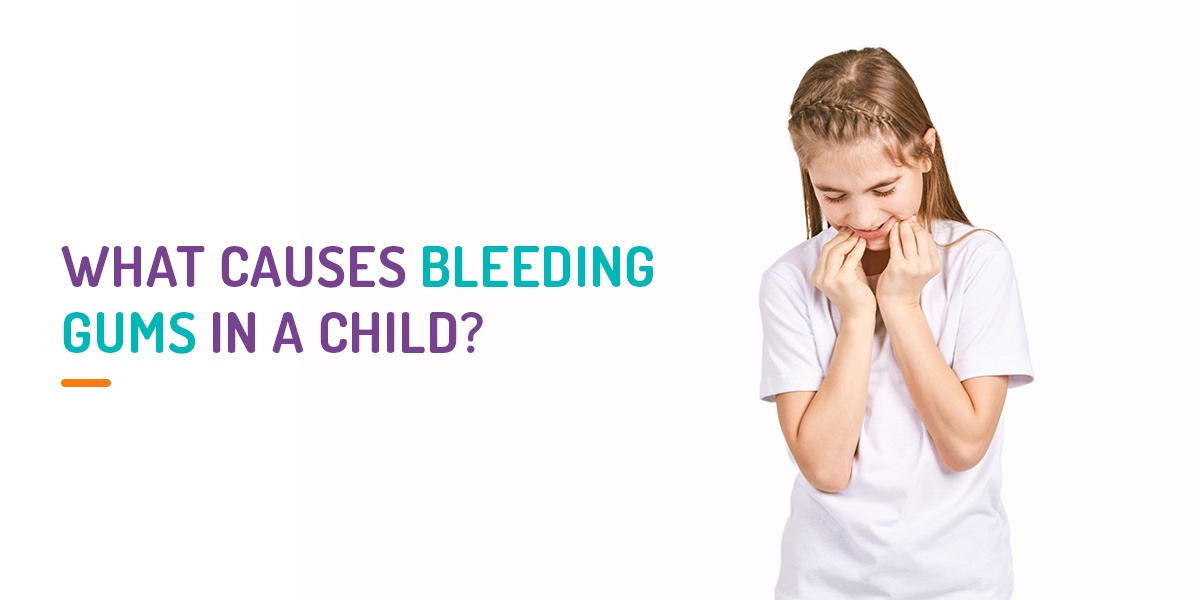It’s bedtime and you’re rushing to get the kids cleaned up. When you check on your child who’s finally brushing their teeth, you notice their gums are bleeding a little. While seeing blood can be stressful, the most likely culprit of bleeding gums is simple.
Sometimes, kids can have gingivitis or periodontitis, which are types of gum diseases with varying severities. These conditions affect the gums, tissues and even the jaw bone. While gingivitis is less severe than periodontal disease, they both require intervention and treatment. However, most cases of gum disease are treatable, and children often don’t know they have it.
If you’re worried about your child’s gum health and notice unusual gum bleeding during or after brushing, schedule an appointment with a pediatric dentist. What does gum disease look like in children? Keep reading to learn more about the symptoms and treatments for the different kinds of gum diseases.
Types of Gum Disease That Affect Children
When it comes to gum disease, what starts as a mild nuisance can become a severe problem when left untreated. In addition, dental hygiene, genetics, health conditions, hormonal changes and certain medicines can lead to gum disease in children.
There are generally two types of periodontal disease that tend to affect children the most:
Gingivitis
While gingivitis is a relatively mild form of periodontal disease, it can still have negative impacts on your child’s dental health. This condition is the first stage of periodontitis, in which plaque on the teeth builds up and causes bacteria to grow and irritate the gums.
There are four categories of gingivitis:
- Recurrent: Recurrent gingivitis comes back again and again after treatment.
- Acute: Acute gingivitis is painful, appears suddenly and occurs over a short period of time.
- Subacute: Subacute gingivitis has a sudden onset but is less painful than acute versions.
- Chronic: Chronic gingivitis is less painful but it lasts a long time.
Periodontitis
If gingivitis is left untreated for too long, periodontitis might form. While gingivitis impacts the gums and teeth, periodontitis can also affect deep tissue and bone, so it’s a serious dental condition. Specifically, plaque that spreads below the gum line due to unhealthy gums can lead bacteria to infiltrate and infect the bone.
This condition might cause loose teeth and even disintegration of the jaw bone in extreme cases. While serious, your child can undergo treatments for chronic and aggressive types of periodontitis.
Does My Child Have Periodontal Disease?
Contact a pediatric dentist when you recognize the following signs of periodontal disease:
- Bleeding: If you notice blood in your child’s spit after brushing or when flossing, it might be a sign of gum disease. This condition can make gums sensitive to friction, but they may not always hurt when they bleed.
- Swelling: If your child has swollen gums around their tooth or teeth, it may be cause for concern. With periodontal diseases, gums might appear swollen or puffy due to the inflammation caused by plaque and bacteria.
- Discoloration: In conjunction with swelling, gums affected by periodontal disease might look bright red — healthy gums tend to be pink and firm.
- Tenderness: While gum disease often occurs without pain, the gums and mouth can become very sensitive in some cases, like with acute gingivitis.
- Bad breath: If you notice a persistent pattern of bad breath in your child despite regular brushing, they may have gum disease. Often, bacteria cause bad breath, and an excess of odor-producing bacteria can be a clear sign of a more serious issue.
- Gum recession: When the gums appear to be pulling away from the tooth, it’s a clear sign something is wrong. Because gums serve to protect the tooth root and deep tissues from bacteria, receding gums can cause your child’s teeth to face more exposure to bacteria.
- Loose teeth: Advanced stages of periodontal disease can lead to loose teeth. If your child’s permanent teeth appear loose and it isn’t a result of any trauma, you should contact a pediatric dentist.
How to Prevent Gum Disease in Children

While it may sound quite serious, most cases of gum disease in children are due to gingivitis, which is common. As much as you might try to instill good brushing habits, kids might still slack off on dental hygiene. The good news is that catching periodontal disease early can prevent many of the more negative symptoms from ever becoming a problem.
The most important prevention method is to establish consistent and thorough oral care habits, including:
- Brushing teeth twice a day
- Daily flossing routine
- Using a soft-bristled toothbrush
- Visiting your dentist for regular cleanings and check-ups
- Maintaining a healthy diet
Treatment Options for Periodontal Diseases
If you suspect gum disease, early treatment is essential. Since other conditions correspond with the symptoms of periodontitis, it’s best to have a pediatric dentist look at your child’s teeth to diagnose the cause. If the dentist does suspect gum disease, they will recommend treatment options based on the severity of the disease.
Call to Schedule A Dental Appointment
For less severe cases, such as certain types of gingivitis, your dentist may recommend performing regular brushing with special toothpaste and brushes and flossing daily. These simple actions can reverse gingivitis when caught early and prevent its recurrence.
If the gum disease is in a more advanced stage, other treatment options include:
- Medications, such as antibiotics or topical antiseptics, to reduce the bacterial buildup
- Deep teeth cleaning to remove excess plaque and tartar
- Surgery to clean infected gums and repair any significant damage
Note that certain effects of periodontal diseases may be irreversible without treatments and interventions. For example, children’s gums cannot grow back, but grafting is a relatively non-invasive surgery that can repair serious cases of gum recession.
While products may advertise that they prevent gum disease and gingivitis, speak with your dentist about the products they recommend to prevent gum disease in children. While mouthwashes might claim to fight gingivitis, you should avoid giving them to children aged 6 and under. Additionally, most lack sufficient antiseptic capacities to kill off bacteria in your mouth. For a mouthwash to counteract gingivitis, talk to your dentist about therapeutic mouth rinses.
Schedule an Appointment at Fox Kids Dentistry & Orthodontics
If you suspect your child might have periodontal disease, schedule an appointment with a pediatric dentist as soon as possible. Be sure to take them somewhere both of you trust so you can have peace of mind and your child can feel comfortable during their visit.
Fox Kids Dentistry & Orthodontics has friendly and compassionate staff that will put you and your child at ease. We strive to make your child’s experience at the dentist positive, and we’ll work hard to provide you with many options so you can make informed decisions about their health.
Contact Fox Kids Dentistry & Orthodontics for an appointment today!


